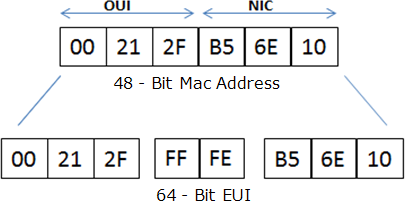An engineer has configured a router to use EUI-64, and was asked to document the IPv6 address of the router.
The router has the following interface parameters:
mac address C601.420F.0007
subnet 2001:DB8:0:1::/64
Which IPv6 addresses should the engineer add to the documentation?
A . 2001:DB8:0:1:C601:42FF:FE0F:7
B . 2001:DB8:0:1:FFFF:C601:420F:7
C . 2001:DB8:0:1:FE80:C601:420F:7
D . 2001:DB8:0:1:C601:42FE:800F:7
Answer: A
Explanation:
Extended Unique Identifier (EUI), as per RFC2373, allows a host to assign iteslf a unique 64-Bit IP Version 6 interface identifier (EUI-64). This feature is a key benefit over IPv4 as it eliminates the need of manual configuration or DHCP as in the world of IPv4. The IPv6 EUI-64 format address is obtained through the 48bit MAC address. The Mac address is first separated into two 24-bits, with one being OUI (Organizationally Unique Identifier) and the other being NIC specific. The 16-bit 0xFFFE is then inserted between these two 24-bits to for the 64-bit EUI address. IEEE has chosen FFFE as a reserved value which can only appear in EUI-64 generated from the EUI-48 MAC address.
Here is an example showing how the Mac Address is used to generate EUI.

Next, the seventh bit from the left, or the universal/local (U/L) bit, needs to be inverted. This bit identifies whether this interface identifier is universally or locally administered. If 0, the address is locally administered and if 1, the address is globally unique. It is worth noticing that in the OUI portion, the globally unique addresses assigned by the IEEE has always been set to 0 whereas the locally created addresses has 1 configured. Therefore, when the bit is inverted, it maintains its original scope (global unique address is still global unique and vice versa). The reason for inverting can be found in RFC4291 section 2.5.1.
Reference: https://supportforums.cisco.com/document/100566/understanding-ipv6-eui-64-bit-address
